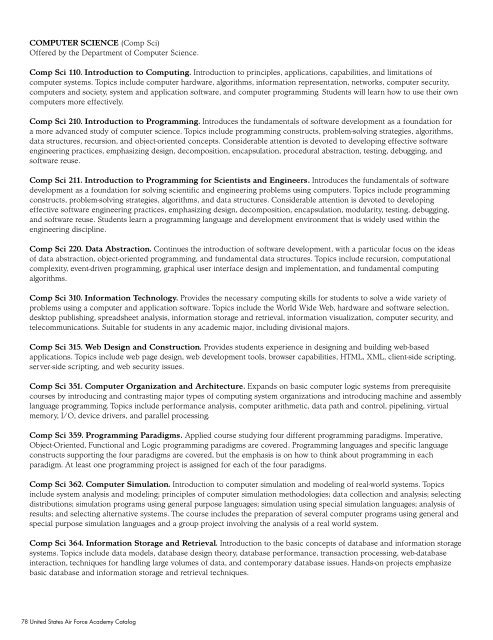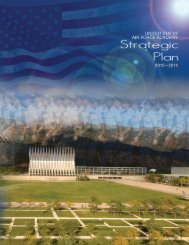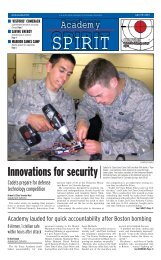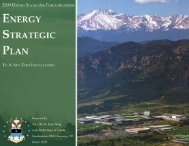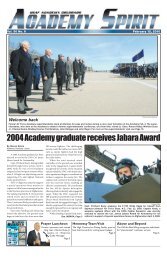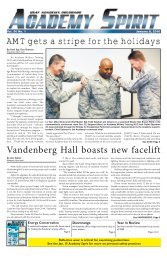2008-2009 Catalog - United States Air Force Academy
2008-2009 Catalog - United States Air Force Academy
2008-2009 Catalog - United States Air Force Academy
Create successful ePaper yourself
Turn your PDF publications into a flip-book with our unique Google optimized e-Paper software.
COMPUTER SCIENCE (Comp Sci)<br />
Offered by the Department of Computer Science.<br />
Comp Sci 110. Introduction to Computing. Introduction to principles, applications, capabilities, and limitations of<br />
computer systems. Topics include computer hardware, algorithms, information representation, networks, computer security,<br />
computers and society, system and application software, and computer programming. Students will learn how to use their own<br />
computers more effectively.<br />
Comp Sci 210. Introduction to Programming. Introduces the fundamentals of software development as a foundation for<br />
a more advanced study of computer science. Topics include programming constructs, problem-solving strategies, algorithms,<br />
data structures, recursion, and object-oriented concepts. Considerable attention is devoted to developing effective software<br />
engineering practices, emphasizing design, decomposition, encapsulation, procedural abstraction, testing, debugging, and<br />
software reuse.<br />
Comp Sci 211. Introduction to Programming for Scientists and Engineers. Introduces the fundamentals of software<br />
development as a foundation for solving scientific and engineering problems using computers. Topics include programming<br />
constructs, problem-solving strategies, algorithms, and data structures. Considerable attention is devoted to developing<br />
effective software engineering practices, emphasizing design, decomposition, encapsulation, modularity, testing, debugging,<br />
and software reuse. Students learn a programming language and development environment that is widely used within the<br />
engineering discipline.<br />
Comp Sci 220. Data Abstraction. Continues the introduction of software development, with a particular focus on the ideas<br />
of data abstraction, object-oriented programming, and fundamental data structures. Topics include recursion, computational<br />
complexity, event-driven programming, graphical user interface design and implementation, and fundamental computing<br />
algorithms.<br />
Comp Sci 310. Information Technology. Provides the necessary computing skills for students to solve a wide variety of<br />
problems using a computer and application software. Topics include the World Wide Web, hardware and software selection,<br />
desktop publishing, spreadsheet analysis, information storage and retrieval, information visualization, computer security, and<br />
telecommunications. Suitable for students in any academic major, including divisional majors.<br />
Comp Sci 315. Web Design and Construction. Provides students experience in designing and building web-based<br />
applications. Topics include web page design, web development tools, browser capabilities, HTML, XML, client-side scripting,<br />
server-side scripting, and web security issues.<br />
Comp Sci 351. Computer Organization and Architecture. Expands on basic computer logic systems from prerequisite<br />
courses by introducing and contrasting major types of computing system organizations and introducing machine and assembly<br />
language programming. Topics include performance analysis, computer arithmetic, data path and control, pipelining, virtual<br />
memory, I/O, device drivers, and parallel processing.<br />
Comp Sci 359. Programming Paradigms. Applied course studying four different programming paradigms. Imperative,<br />
Object-Oriented, Functional and Logic programming paradigms are covered. Programming languages and specific language<br />
constructs supporting the four paradigms are covered, but the emphasis is on how to think about programming in each<br />
paradigm. At least one programming project is assigned for each of the four paradigms.<br />
Comp Sci 362. Computer Simulation. Introduction to computer simulation and modeling of real-world systems. Topics<br />
include system analysis and modeling; principles of computer simulation methodologies; data collection and analysis; selecting<br />
distributions; simulation programs using general purpose languages; simulation using special simulation languages; analysis of<br />
results; and selecting alternative systems. The course includes the preparation of several computer programs using general and<br />
special purpose simulation languages and a group project involving the analysis of a real world system.<br />
Comp Sci 364. Information Storage and Retrieval. Introduction to the basic concepts of database and information storage<br />
systems. Topics include data models, database design theory, database performance, transaction processing, web-database<br />
interaction, techniques for handling large volumes of data, and contemporary database issues. Hands-on projects emphasize<br />
basic database and information storage and retrieval techniques.<br />
78 <strong>United</strong> <strong>States</strong> <strong>Air</strong> <strong>Force</strong> <strong>Academy</strong> <strong>Catalog</strong>


